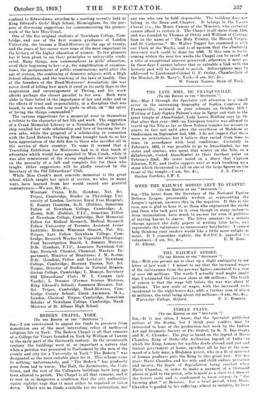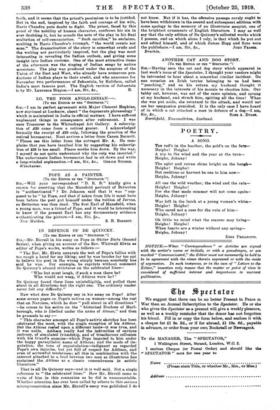INDIAN PLAYS.
• [To THE EDITOR OF THE " SPECTATOR.") SIR,—It is not often, I know, that the Spectator publishes notices of the drama, but I think. your readers may . interested to hear of the production last week by the Indian Art and Dramatic Society of The Ordeal, by K. N. Das Gupta and K. C. Chunder. The play is based on the legend of Hari: Chandra, King of Oude—the Arthurian legend of India—in which the King, famous for warlike deeds abroad and just and lenient governmentat home, sacrifices all he hus at the command of a holy man, a Brahmin priest, who in a fit of mistrust of human goodness puts the King to this great test. For five years Harts Chandra and his wife and child endure privation and misery, the depth of degradation being reached when Harts Chandra, in order to make a payment of a thousand pieces of gold to the priest, sells himself as a slave to a man of the lowest caste and is condemned to burn corpses in " the burning ghat" at Benares. For a brief period, when Hari: Chandra is goaded by his sufferings almost to insanity, lie lures
faith, and it seems that the priest's pessimism is to be justified. But in the end, inspired by the faith and courage of his wife, Haris Chandra puts doubt to flight. The priest, faced by this proof of the nobility of human character, confesses his sin in ever doubting it, but he sounds the note of the play in his final exaltation of self-renunciation. " Such sacrifice," he exclaims, exulting in Haris Chandra's triumph, " the world counts not sane." The dramatization of the story is somewhat crude and the writing not particularly inspired, but the play was most Interesting in revealing the Indian outlook, and giving some Insight into Indian customs. One of the most attractive items of the afternoon was the singing of Indian songs by native musicians. The play was produced under the auspices of the Union of the East and West, who already have numerous productions of Indian plays to their credit, and who announce for November two performances of Sakuntala, by Kalidasa, called India's most famous poet. The English version of Sakuntala is by Mr. Laurence Binyon.—I am, Sir, &c., B.











































 Previous page
Previous page